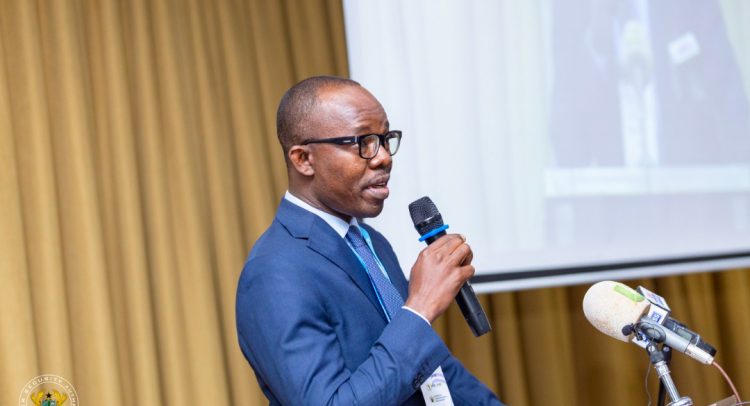Dr Antwi Boasiako
Razak Seidu received a call from an unknown caller who identified himself as an agent from a network provider. He requested that Razak switches off his phone for about 30 minutes for them to carry out system upgrade.
After switching off the phone, the caller again called Aunty Mariama, Razak’s Auntie, to inform her that Razak was involved in an accident and had been rushed to the hospital.
The caller said doctors needed GH¢1,500 as down payment before they attend to him. Auntie Mariama, devastated by the news, hurryingly transferred the said amount to the caller to make the payment.
After some minutes, Razak received a call from some family members who heard the news and had called for confirmation.
It was later that Auntie Mariama realised that she had been defrauded, and that Razak was well and sound.
The Cyber Crime Unit of the Ghana Police Service has said that among the cyber crime offences, fraud, also known as scam (be it romance, investment and recruitment fraud) has been leading other crime cases since 2016.
“Digital extortion, unauthorised access to people’s account, using fake Facebook account, stealing of information, publication of obscene materials, threats of death and harm, momo fraud, threat of distribution of obscene materials, cyber bullying, undermining privacy and forgery also followed in that order,” says ACP Dr. Gustav Herbert Yankson, former director in charge of the Cyber Crime Unit and Digital Forensic Lab of the Ghana Police Service.

Deputy minister of communicational Digitalisation, Ama pomaa Boateng
He maintained that a total of $20,382,058 was lost to Cyber Crime in 2021.
Out of the amount, a total of $110,412 was retrieved from suspects out of about three hundred cases recorded by the unit.
He said seven cars were also retrieved from the suspects.
He reveals that 45 of the cases are in court, but the police got convictions for only six of the suspects, some serving a minimum of two years and maximum of 10 years in prison.
In 2021, the police arrested more than 300 suspected criminals for having committed various cyber offences.
However, some of these complainants refused to assist the police to investigate the matters, citing personal reasons including tarnishing their reputation and that of their company as excuses.
Comparatively, government lost about $19 million in 2020, $9 million in 2019, $105 million in 2018, $69 million in 2017 and $35 million in 2016.

Dr.Yankson
Commitments
Dr. Yankson said in 2019, the drastic decrease was as a result of the massive cyber security awareness campaigns organised in collaboration with the Cyber Security Authority (CSA).
He said several police personnel were also trained in cyber crime investigation, while lots of the cyber crime cases were also taken to court with high convictions.
Executive Director in charge of the Cyber Security Authority (CSA), Dr. Albert Antwi Boasiako, says the authority in collaboration with stakeholders educated about 60,000 youth in the second cycle institutions on cyber security issues last year, as part of the national cyber security awareness month.
He said in the year 2020, Ghana passed the Cybersecurity Act, 2020 (Act 1038) which led to the birth of Cyber Security Agency, which was then a centre.
“The CSA is responsible for regulating cybersecurity activities and developing cybersecurity in the country, among other related functions.”
He said CSA is collaborating with security agencies to investigate and prosecute organised crime committed within the cyber space.
“As a regulatory body, the CSA has a load to support law enforcement and security agencies to carry out their legal mandate in addressing cyber crime and cybersecurity challenges.”
One of such critical area is the interception point provided in section 69 of the Cyber Security Act, which allows law enforcement agencies to access data from relevant service providers to support lawful investigation activities,” he stressed.
Dr. Antwi Boasiako noted that the CSA Act has also improved the data retention regime for law enforcement purposes, and will be working with agencies represented in the Joint Cyber Security Committee (JCC) to enforce section 77, which mandates service providers to keep data for a certain period of time.
Addressing cyber security experts in Accra, Dr. Boasiako said cybersecurity, is not solely an issue for governments, and ensuring a free, open and secure cyberspace is not the preserve of any single stakeholder group.
“As noted elsewhere, cybersecurity is a shared responsibility which requires coordinated action on the part of government authorities, the private sector and civil society and other agencies, and we shall collaborate and work hard to ensure a safe, secure and resilient digital realm for Ghana and Africa.”
Government Commitment
Deputy Minister of Communications, Ama Pomaa Boateng, says cyber attacks have serious implications on socio-economic development and on the national security of our countries.
“Many of our citizens have experienced cyber security incidents including online fraud, online blackmail, online impersonation and identity theft, publication of non-consensual intimate images, unauthorised access, social engineering scams, hacking into protected systems and other cybersecurity related breaches, as a single cybersecurity incident can have global reach and devastating effects on governments, businesses and individuals,” the deputy minister disclosed.
Adding that government, through the Ministry of Communications and Digitalisation, is working closely with other relevant ministries and agencies, international partners and private sector stakeholders, to ensure that various digitalisation interventions rolled out are secured.
“Since cybercrime has no boundaries, and is not limited to one geographical location, we are happy to cooperate with our African partners and stakeholders to further develop our capacity through joint initiatives,” she added.
By Linda Tenyah-Ayettey

